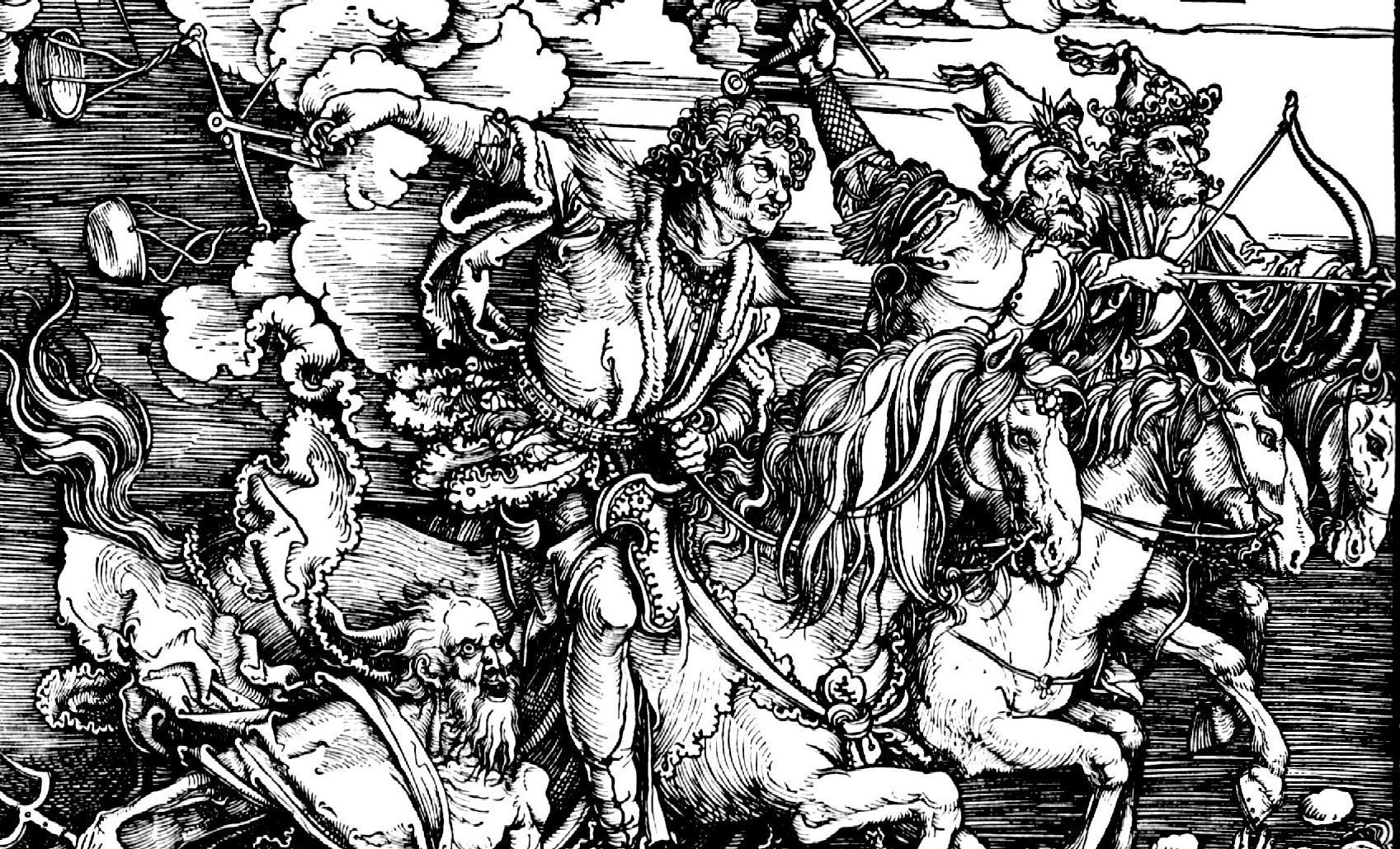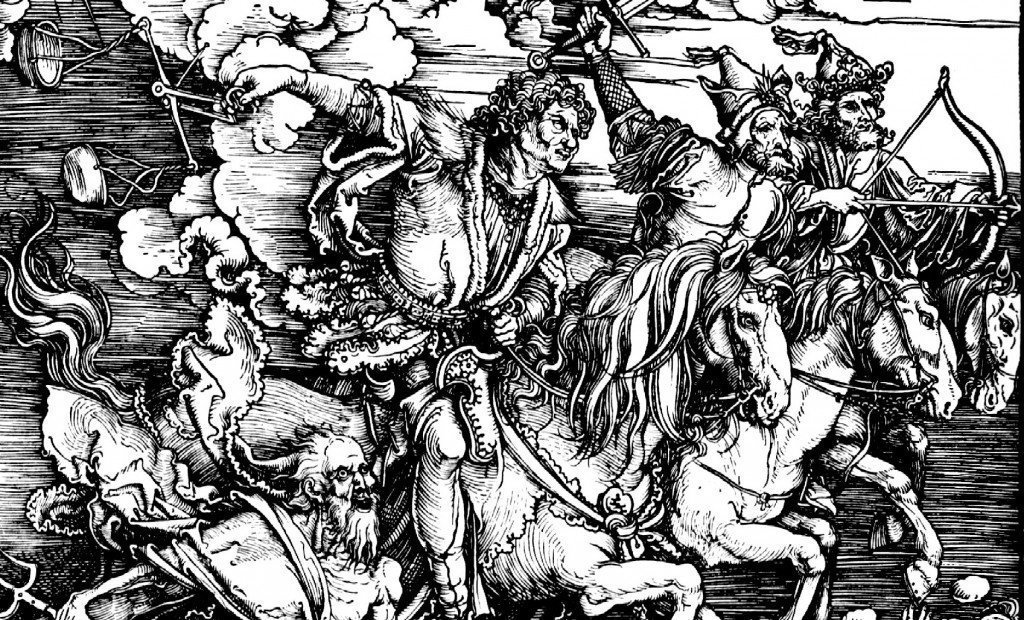
April 17th, 1999
«When the Berlin Wall broke on the night of November 9th 1989, it was the Jalta-treaty that was torn down, later to be sold in pieces with graffiti on it by street peddlers by the Brandenburg Gate.» «And not only Jalta is lying there among the rubble after the Berlin Wall. In the ruins of a Yugoslavia that is no more, lies also much of the outcome of the first imperialist war in Europe.»

I wrote these passages in 1992 in a small book called Vargtid – eller myten om en fredelig verdensorden (Wolf-age – or the Myth about a Peaceful World Order).
Wolf-age is referring to the profecies of the Norse seeress in the Islandic poem of Voluspå, where she looks into the future of Man, saying:
Axe-age, sword-age — sundered are shields —
Wind-age, wolf-age, ere the world crumbles;
Will the spear of no man spare the other.
What was on my mind when I wrote that book was to counter the tremendous illusions spread in that period about the impending age of peace and prosperity lying just around the corner. Some readers will remember the book by Francis Fukuyama: «The End of History and the Last Man», which argued that with the US victory in the Cold War, we were now at the «end point of mankind’s ideological evolution» and hence the american style liberal democracy would be the «final form of human government.»
My view was the opposite, I held that just because of the fall of the Soviet Union and the dismemberment of Yugoslavia, mankind was not heading for peace and stability, but for war and instability.
Alas the wars of the 1990’s have proven me all too correct. Is it something that is written in fire over the last century, it is the fact that in the age of imperialism there exists a «horror vacui» – a fear of the empty space – in the system of hegemony. Where a fallen power leaves a power vacuum, other powers will contend to fill that temporary emptiness with their own power.
World War I did not start because of the assasination of Arch Duke Ferdinand, heir to the throne of Austria-Hungary. But when Austria declared war on Serbia to avenge the murder, the cup was full for Russia. Russia mobilized, which again gave Germany an excuse for declaring war on Russia. For all the big powers of Europe the power balance on the Balkans was such a delicate question that they were soon drawn into the maelstrom of war because of what in the beginning was yet another local war. The Versailles Treaty after the war was nothing else than the partition of the losers among the winners. Austria-Hungary was dissolved. The Ottoman empire, which had held Turkey, big parts of The Balkans, Egypt and The Middle East, fell, and other powers rushed in to fill the gap. Britain, for example took Egypt and Palestine. France took Syria. And The Balkans were divided in small independent states. Yugoslavia was formed as a compromise between the power blocks.
The arrogance of the victorious powers after the war laid the fundations for the next. Conquered Germany was humiliated and impowerished by the heavy burden of war reparations. This was like sowing the dragon seed preparing the gounds for Hitler. He could mobilize on hurt national pride, and very real poverty.
The terms for the victors of World War II was, as we all know, drawn up in February 1945 in the Black Sea resort Jalta between the great threesome, Churchill, Stalin and Roosevelt. I spite of the Cold War, The Treaty of Jalta stood the test through civil war in Greece, the cricis in Hungary 1956 and the invasion by the Warsaw Treaty in Czechoslovakia in 1968. It held on until the Berlin Wall crumbled in November 1989. And with the dissolution of the Soviet Union and Yugoslavia, it became clear: The balance of power in Europe created through the horrible bloodshed of the world wars, was in shambles.
In the age of imperialism this means only one thing: It is time for a new partition of the spheres of influence and hegemony. The fall of the Soviet Union and Yugoslavia had opened enourmous tracts of land open for contention. Between the eastern border of West Germany and the western border of Russia, between the Baltic Sea and northern border of Greece and between the Adriatic Sea and The Black Sea and further on through all the Central Asian former Soviet republics up to the western border of China, lay an enormous power vacuum open for contention. Who were to take over the Soviet dominance over The Baltic States, Poland, Hungary, Czechoslovakia, DDR, Rumania, Ukraina, Belarus, Moldova, Bulgaria. Who were to take controll over Albania, the former Yugoslav republics and the broad girdle of states from Georgia to Uzbekistan? In the age of imperialism such questions have a strong tendency of leading to war.
Never before in the age of imperialism has such an immense territory been open for rivalry. This leads to an instability so great that war is hardly avoidable. This is even more so since the US victory has swapped the balance of terror to the imbalance of terror, wars have come as beads on a thread in what was suppose to be the bright new era of peace and security. Alas there is no reason to believe that this ends with NATO’s war of aggression against Yugoslavia.
The establishment of Yugoslavia in 1918, continued under Titos Yugoslavia after WWII, was a compromise putting the lid on many potentially explosive contradictions after the fall of the big powers. When Germany in 1991 pressed for a hurried recognition of among others Croatia, reestablishing the traditional German-Croat relationship, the compromise was broken. Germany acted deliberately and stobbornly against the advice of UN Secretay General Peres de Cuellar, and headed the western rush for recognition. That gave the battle cry for fight over borders and territories. It gave the green light for the ethnic cleansers in Croatia as well as in Bosnia and Serbia. The forces who wanted to drive the serbs out of Krajina and East Slavonia and make Western Bosnia a croat republic, and the serb netionalist who dreamt of a Greater Serbia on the ruins of the state of Tito. Germany’s eagerness to demonstrate its reborn guts and establish its traditional ties with Croatia, propelled the civil wars and forwarded the ethnic cleansing.
The US was taken by supprise by this move, but didn’t take long to join in for the partition of the Balkans. First of all Albania was made a US puppet. The utterly corrupt and criminal regime of Salih Berisha could not have existed for long without American support. In return the US got a strong military foothole in the once so proud «Country of the Eagles» for free. (The fact that Albania’s colonial status now is confirmed officially by leaving over the power of the air space and all military installations to NATO is only the final confirmation.) From this vantage point the US could advance for the prey. By playing the Albanian card, came in a favourable position to chop up the remeinder of Yugoslavia and possibly also Macedonia.
The US power play in the Balkans would have been out of the question if the Soviet Union hadn’t gone bust. Without an impowerished, reduced and crippled Russia, it wouldn’t have been possible for the West og carve up the Balkans without starting WWIII.
If the West had been really concerned about peace when Yugoslavia was dissolved, non of the former republics should have got neither recognition nor promise of recognition before there had been an international settlement of border disputes and minority rights. This could have been combined with international guarantees for development funds after an agreement. Such a procedure would have blocked the way for the nationalist extremists and rewarded cooperation and tolerance. When this method was not used, it must be because strong interests craved for a hurried partition of former Yugoslavia. Naturally extremist Croat and Serb nationalists were among those. But they would not have suceeded hadn’t it been for the West’s interests in destabilization and colonization.
The Western selective interest for human rights also bear witness to this. When Turkey exterminates Kurd villages, NATO answers by sending more armour. When the leader of the Kurd liberation army seeks asylum in the West, the US does its utmost to help the very regime that butchers his people capture their leader and put him on trial with a probable death penalty as a result. When it comes to the liberation struggle of the kosovars however, quite opposite principles are employed. Those acts by the UCK, if carried out by the kurds would have been labeled murder and terror, suddenly becomes heroic acts in a national liberation struggle. All of a sudden the US becomes the high protector of the armed liberation struggle. Instead of beeing treated like terrorists and criminals, the UCK-leders are treated like heads of state and equal partners to the elected leaders of the state they are fighting. All who have followed US foreign policy for some decades understand that the UCK is only a pawn in the game, as ready to be dropped as were the Kurds of northern Iraq, once it suits US interests.
The attitude to ethnic cleansing is as lopsided. When Croatia burnt Serb villages and butchered defenceless men, women and children in serb dominated Krajina in 1995 and drove hundreds of thousands out of their territory, the US and the West didn’t answer by war against the attackers, but quite contrary. The US and Germany saw to it that the Croat military had sufficient gunpower and equipment to carry out the attrocities and to be on the safe side the West even gave active assistance in knocking out Serb communication centres and key positions.
The reason for this sad state of affairs is naturally that this is not civilization’s war on barbary, but a new imperialist war for repartioning the world. This war has gone on in the Balkans for the best part of the nineties, and I am afraid, it is not over with this war on Yugoslavia. In its power arrogance the US has scrapped its relations to Russia. The US and NATO can surely crush Serbia, but not without crushing Russian illusions about peaceful coexistence with the west in the same blow. The West may be hoodwinked by the fact that Russia is bancrupt and economically speaking in the pocket of the World Bank. But this is superficial. Basically Russia is a rich country poorly governed. Prowided a change in politics Russia could arise from the ashes and become very powerful. If it reversed marked liberalism and organized a centralized restructuring of the economy Russia coul emerge quite strong. The Russians are not stupid. They see clearly that what the West is doing with Yugoslavia, it can do with the former Soviet republics along the borders of Russia. And even Russia itself is in danger. If NATO comes strengthened and victorious out of this war, the alliance can play the same game on Russia through manipulating its ethic conflicts in the future. NATO has demonstrated a neglect of the UN and The Security Council and by setting aside all the principles in International Law. This experience will have a tremendous effects on Russian politics in times to come. The leaders that wait to take over after Yeltsin must develop a new strategy to counter NATO’s advance towards the borders of Russia.
Let naïve people believe that all this adds up to bright prospects of peace and harmony. The rest of us must raise the fight against the war and the war mongers. The Wolf-age is dawning.


 oss 100 kroner!
oss 100 kroner!